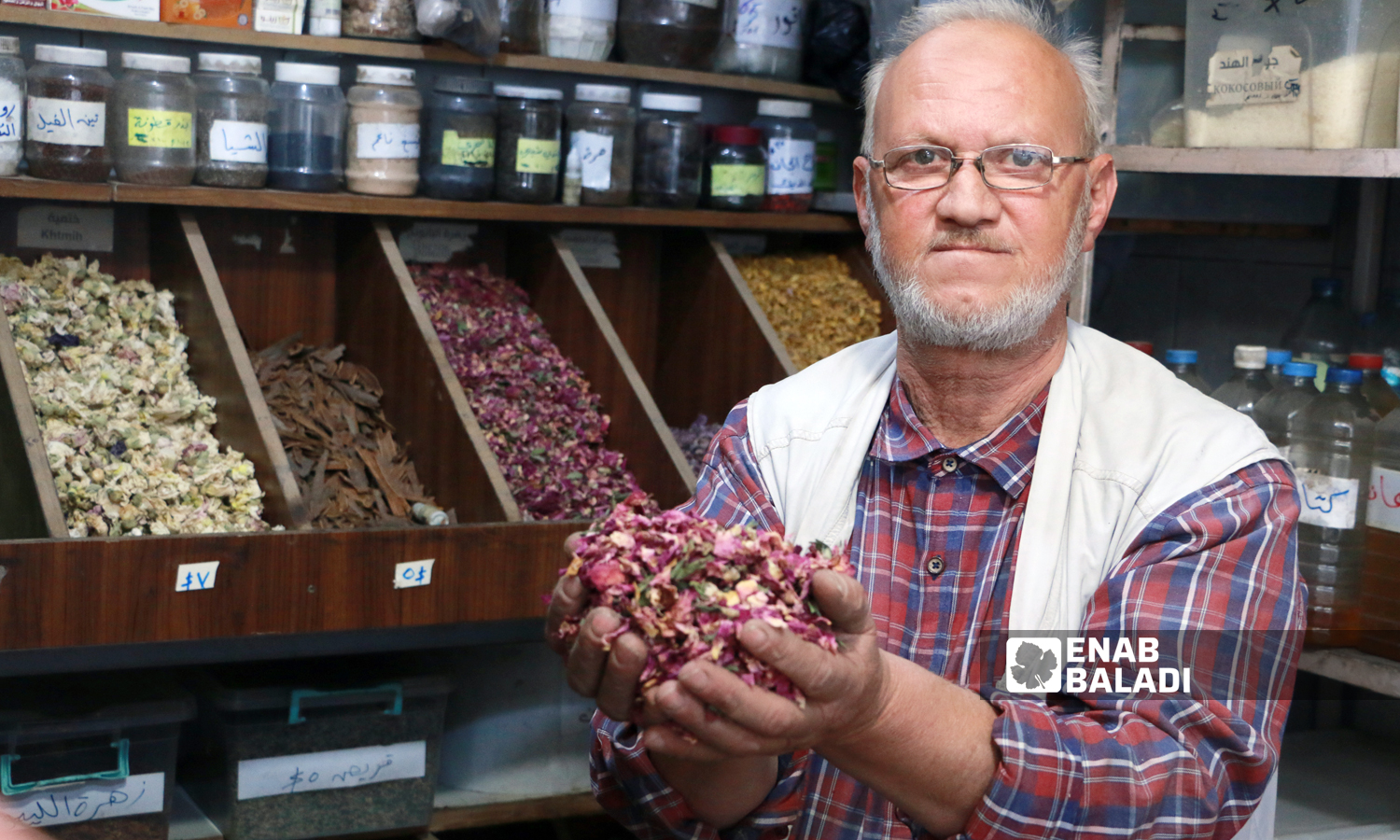



Idlib – Hadia Mansour
Sulaf al-Daher, 40 years old, started practicing herbal medicine after learning the craft from her grandmother. Many people in Idlib need this kind of medication due to the prohibitively high prices of medicines there.
Sulafa told Enab Baladi that she opened a herbal clinic inside her home in Sarmad city on the border with Turkey and started treating many illnesses, including cold, cough, bronchitis, and even chronic diseases like diabetes, high blood pressure, and heart disease.
She added that she prescribes specific amounts of herbs for patients to take in order to get better.
She pointed out that many patients come to her clinic. And most of her patients are children and women who decided not to take chemicals anymore because they think they are ineffective in combating their diseases or because of their high prices. The profits of medicine in Idlib increased by 100 percent due to the lack of supervision and inspection of the pharmaceutical sector in the region.
Subhia al-Aswasd, a woman in her sixties, practiced herbal medicine for decades. She prescribes herbs suitable for many patients who come to her clinic to obtain free treatment. Unless she has the required herb available, so she takes a nominal fee from the patient.
Subhia told Enab Baladi that she wants to work to please God, and she does not want to keep what she has learned about herbal science from the people who most need it, especially in this challenging time. Ten years of the Syrian war had a devastating effect on the medical sector; a lack of access to medical supplies, medical care, medicines, and specialized doctors.
The benefits of herbalism: herbal medicine was one of the oldest medical sciences inherited by different civilizations. Known as alternative medicine, it can be more effective than modern medicine in treating certain diseases, said Sabiha to Enab Baladi.
“Chemical medicine can trigger side effects, because of their chemical structure unlike herbs and alternative treatments.”
Subhia pointed out that herbal medicine—such as cactus, alfalfa juice, garlic, ginger, black cumin seeds, coconut oil, etc.— is used to cleanse the digestive system, boost nutrient absorption, strengthen body immunity, cure high blood pressure, lower cholesterol, treat skin ulcers, coronary artery disease, and other diseases. Each herb or plant has multiple benefits and therapeutic features.
Herbal clinics, which women occupy, have spread widely in Idlib. They have been highly accepted by patients who depend on these clinics to treat various diseases without dealing with the high cost of medical examinations, the high price of medicines, the lack of medicine, and expired medicines.
After losing hope in standard medication, Nour al-Shallah, 25, decided to visit the herbal clinic in Idlib to heal her sinuses, especially since doctors did not advise her to have surgery because sinuses will likely grow back and cause an infection.
Nour al-Shallah found what she was looking for in herbal medicine when the herbal expert described a mixture of natural apple vinegar, ginger, pepper, and lemon juice. “I felt better than I had ever felt and the inflammation and pain were finally gone,” she said to Enab Baladi.
Similarly, Salam al-Asaad, a diabetic patient aged 45, told Enab Baladi that after she used a herbal blend of fenugreek, olive leaves, cinnamon, ginger, cumin, and cloves, she experienced remarkable improvement, with results comparable to standard medication.
Despite the advantages of herbal medicine and its success in treating many diseases, which has gained support among patients over the years, it has some negatives related to the long duration of treatment and slow recovery compared to chemical drugs.
Also, some herbal remedies can cause harm if a patient does not stick to his medication routine; that is not taking his treatment as prescribed- the right dose, at the right time, in the right way and frequency, said herbalist Subhia.
The assistant director of Idlib health, Refaat al-Farhat, said herbal medicine is ancient and has a scientific basis, and it is rich in knowledge, which means it helps heal some illnesses.
In addition, modern medicine also benefits from many plant-derived compounds, which constitute a primary component in the pharmaceutical industry.
Several herbal medicines are subjected to the same regulatory standards as conventional medicines in terms of efficacy and safety. However, “some herbs demonstrate no adverse effects nor recovery effects.” They are not a cure, according to the doctor.
The medical sector in northwestern Syria suffers a shortage of medical services and supplies due to the military actions and the systematic bombing of the region over ten years, as well as the outbreak of the new coronavirus pandemic (COVID-19).
The medication market in the region is also experiencing a rise in prices due to the lack of sufficient oversight.
if you think the article contain wrong information or you have additional details Send Correction